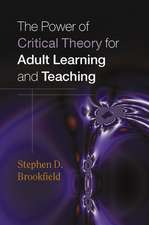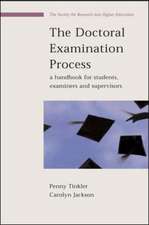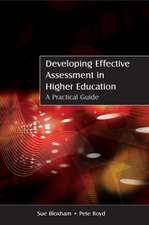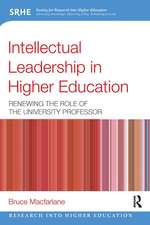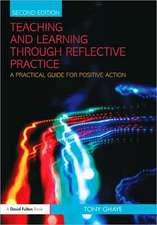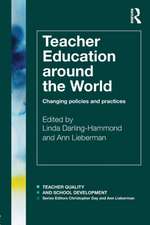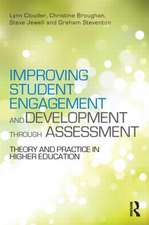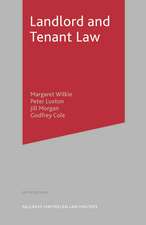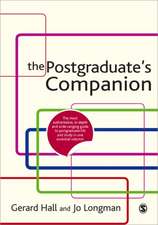Researching with Integrity: The Ethics of Academic Enquiry
Autor Bruce Macfarlaneen Limba Engleză Paperback – 5 dec 2008
Based on the notion of ‘virtue’ ethics, this book proposes an alternative approach to research, which focuses not only on ethical rules and protocol to avoid unethical research, but encourages academic, professional and character development and allows for the exercise of personal judgement.
Themes considered include:
Increased competitiveness between academics and concentration of funding in fewer universities
Increasingly bureaucratic approval of processes focused on the treatment of human and animals in research
Meeting the expectations of research sponsors
‘Taboo’ research topics and methods
Exposing findings to the scrutiny of peers, taking credit for the work of others and self-citation
Bullying of junior researchers and plagiarism
Power and influence of institutional, discipline-based and professional organisations
Illustrated throughout with short narratives detailing ethical issues and dilemmas from international academic researchers representing different disciplines, research cultures and national contexts, this books proposes a an alternative approach to research which provides all research professionals with the intellectual tools they need to cope with complex research.
Preț: 386.30 lei
Nou
73.92€ • 77.28$ • 62.47£
Carte tipărită la comandă
Livrare economică 06-20 martie
Specificații
ISBN-10: 0415429048
Pagini: 206
Ilustrații: 3 tables
Dimensiuni: 152 x 229 x 8 mm
Greutate: 0.38 kg
Ediția:New.
Editura: Taylor & Francis
Colecția Routledge
Locul publicării:Oxford, United Kingdom
Public țintă
Academic and Professional Practice & DevelopmentCuprins
@contents:TABLE OF CONTENTS Pages
Foreword by Stephen Rowland v-vi
Preface vii
Acknowledgements viii
Introduction
Part A: From principles to virtue
1: The legacy of Nuremberg
2: Challenging principles
3: Developing integrity
Part B: Living the virtues
4: Courage
5: Respectfulness
6: Resoluteness
7: Sincerity
8: Humility
9: Reflexivity
Part C: Integrating integrity
10: The performative culture
11: Learning about virtue
12: The good professor
Bibliography
Index
Narrative index Page
4.1 Crossing the boundary 71
- The complexities of ‘confidentiality’
- Experimenting with the environment
- Interviewing the vulnerable
- Permissions and pressure
- The ethics of attraction
6.1 Repeating the experiment
6.2 Slow progress
- Trusting the proof
- Trimming the data
- A tempting citation
- Getting the order right
- Credit where credit is due
- Politics and personalities
- The agreeable interviewer
Recenzii
Notă biografică
Bruce Macfarlane is Professor of Higher Education at the University of Portsmouth (UK) where he is also Head of Academic Development. His previous books include Teaching with Integrity and The Academic Citizen. He is a Vice Chair of the Society for Research into Higher Education.
Descriere
There is increased emphasis internationally on ethically sound research, and on good training for research supervisors. Researching with Integrity aims to identify what and how research can be undertaken ethically and with ‘virtue’ from initial conception of ideas through to dissemination. It outlines the context in which academics engage in research, considering the impact of discipline and institutional culture, the influence of government audit of research ‘quality’, the role of government and quangos, professional organisations and business sponsors, and examines the effects of the increasing power and influence of funding bodies, university ethics committees and codes of practice.
Based on the notion of ‘virtue’ ethics, this book proposes an alternative approach to research, which focuses not only on ethical rules and protocol to avoid unethical research, but encourages academic, professional and character development and allows for the exercise of personal judgement.
Themes considered include:
Increased competitiveness between academics and concentration of funding in fewer universities
Increasingly bureaucratic approval of processes focused on the treatment of human and animals in research
Meeting the expectations of research sponsors
‘Taboo’ research topics and methods
Exposing findings to the scrutiny of peers, taking credit for the work of others and self-citation
Bullying of junior researchers and plagiarism
Power and influence of institutional, discipline-based and professional organisations
Illustrated throughout with short narratives detailing ethical issues and dilemmas from international academic researchers representing different disciplines, research cultures and national contexts, this books proposes a an alternative approach to research which provides all research professionals with the intellectual tools they need to cope with complex research.

